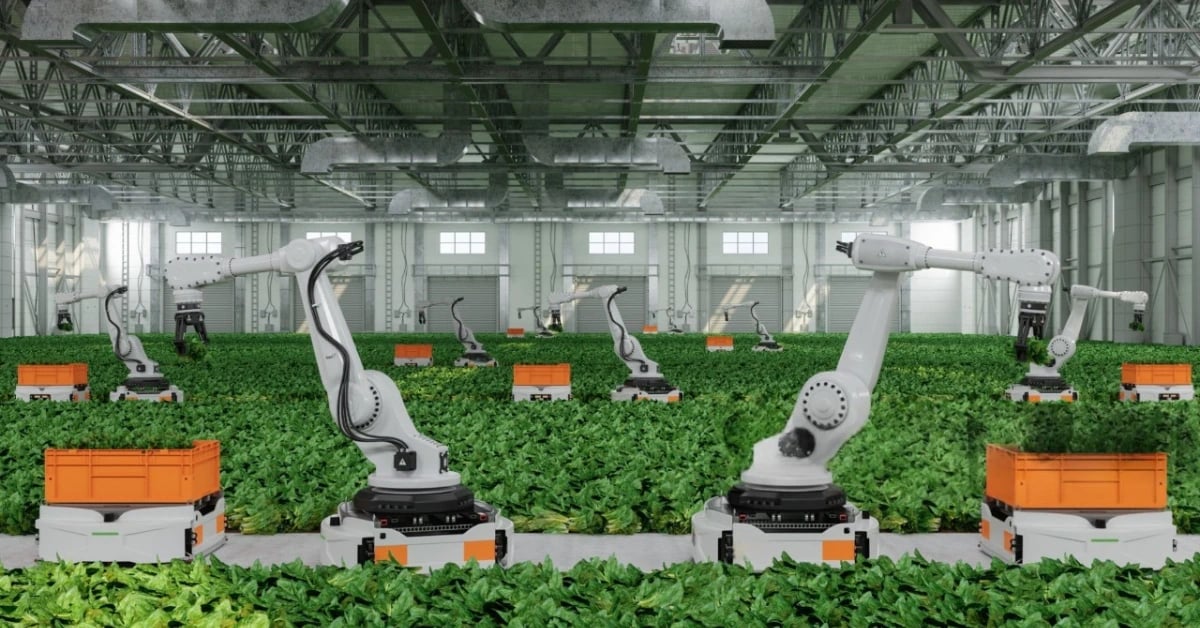Artificial intelligence (AI) is no longer a distant frontier for Africa; it is fast becoming a driver of innovation across key industries. From healthcare and agriculture to finance and sustainability, African startups are using AI to build practical solutions that address everyday challenges across the continent.
These innovations are improving lives, creating jobs, and demonstrating that home-grown technology can deliver global-level impact. Across Nigeria, Kenya, South Africa, Egypt, Rwanda, Senegal, and Ghana, startups are combining local insight with cutting-edge AI to solve problems unique to Africa’s context.
Here are 10 African startups leveraging AI to address real-world challenges and help shape a smarter, more inclusive future for the continent.
1. AwaDoc (Nigeria)
AwaDoc is bridging Nigeria’s healthcare access gap using AI-powered medical technology. The platform connects patients to licensed doctors through intelligent chatbots and virtual consultations. Its AI system analyses symptoms, matches them with known conditions, and provides recommendations or directs users to medical professionals.
This solution is reducing hospital waiting times and helping underserved communities access quick, affordable healthcare. By digitising primary care, AwaDoc is making medical support more accessible to millions who struggle to reach traditional health facilities.
Unlike conventional telemedicine platforms, AwaDoc operates as an AI-powered health chatbot on WhatsApp, making it easily accessible to anyone with a smartphone and internet connection. To get started, users can save the number +1 (502) 627 0621 and send a simple “hello” message to begin a health consultation.
2. DataProphet (South Africa)
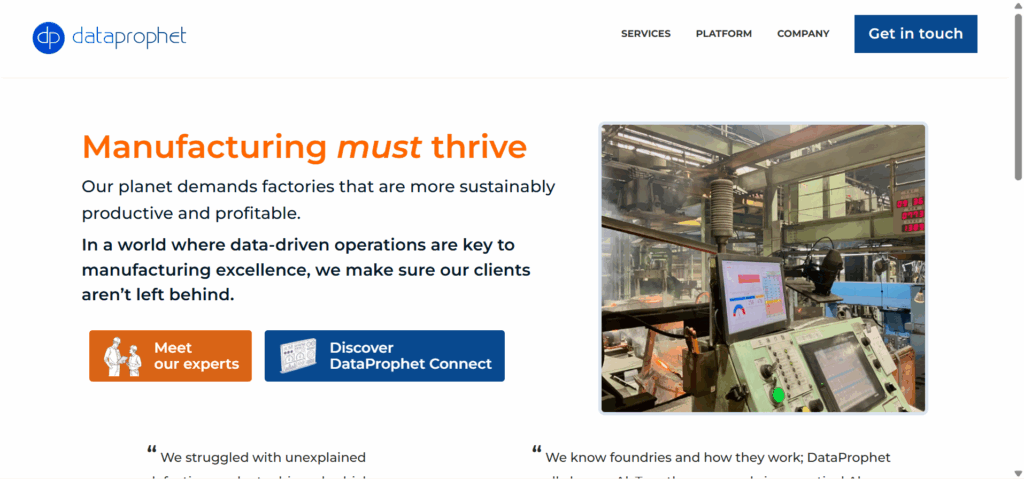
South African startup DataProphet uses AI to optimise manufacturing efficiency. Its machine-learning algorithms analyse production data to predict equipment failure, reduce waste, and improve quality control. By spotting patterns that humans often miss, DataProphet helps factories make faster, smarter adjustments.
The result is improved output and lower costs for manufacturers. Through its predictive analytics, DataProphet is positioning Africa as a serious player in industrial automation and digital manufacturing.
3. Smartel Agric Tech (Rwanda)
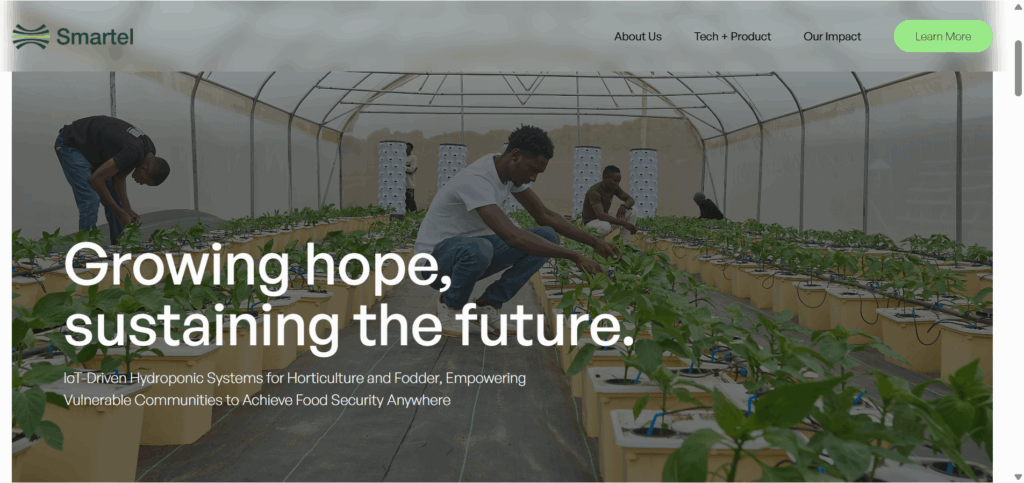
Smartel Agric Tech is a Rwandan agri-tech startup using artificial intelligence to transform small-scale farming across East Africa. The company focuses on helping farmers make data-driven decisions that improve productivity and sustainability. By combining AI, satellite data, and IoT sensors, Smartel provides actionable insights on soil health, weather forecasts, irrigation needs, and pest management.
Through its digital platform, farmers receive real-time recommendations directly on their mobile devices, even in rural areas with limited internet connectivity. The AI system analyses environmental data to predict risks like droughts or pest outbreaks, enabling farmers to act early and avoid losses.
Beyond individual farms, Smartel Agric Tech partners with cooperatives and government agencies to promote climate-smart agriculture and strengthen regional food security. Its goal is to make precision farming accessible and affordable for African farmers, empowering them to increase yields, protect resources, and build resilience against the growing impacts of climate change.
4. Amini AI (Kenya)
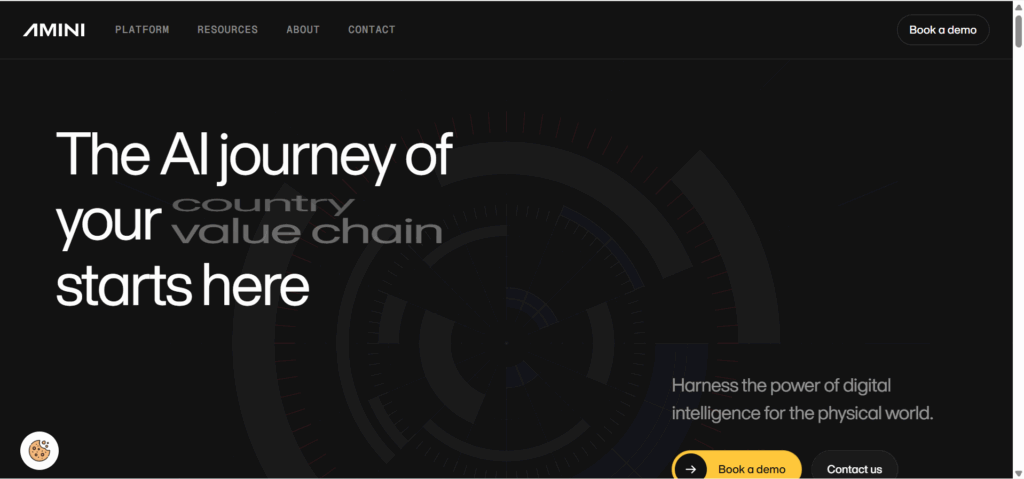
Amini AI is tackling Africa’s data scarcity problem using a mix of satellite imagery and artificial intelligence. The Kenyan startup maps environmental and agricultural data across the continent to help organisations monitor soil, vegetation, and carbon levels.
Its insights enable governments, businesses, and NGOs to make evidence-based decisions around food security and sustainability. By filling critical data gaps, Amini AI is empowering Africa’s fight against climate change with better, localised intelligence.
5. Convertedin (Egypt)
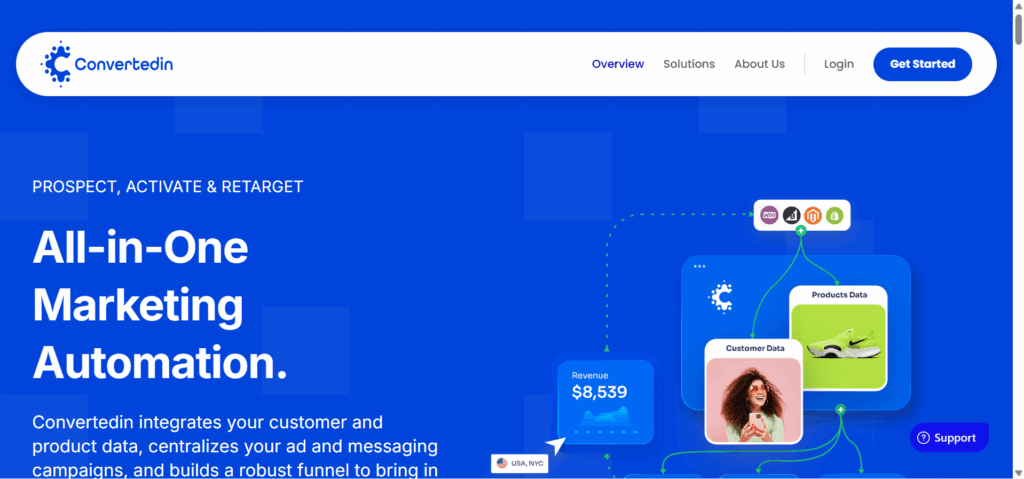
Convertedin is transforming digital marketing for African retailers by using AI to make customer engagement smarter and more data-driven. The platform gathers and analyses customer data from multiple sources, including websites, apps, and social media, to understand buying behaviour and preferences. Using machine-learning algorithms, Convertedin automatically segments audiences, predicts purchase intent, and recommends products tailored to each shopper’s interests.
This AI-powered personalisation helps e-commerce businesses improve ad performance, boost conversions, and reduce wasted marketing spend. Instead of relying on one-size-fits-all campaigns, brands can deliver the right message to the right customer at the right time.
For small and medium-sized businesses, Convertedin’s automation removes the need for expensive marketing teams or complex tools. Its AI engine handles everything from targeting and campaign optimisation to customer retention strategies, helping African retailers compete effectively with global players. In doing so, Convertedin is solving a real-world problem: making data-driven marketing accessible and affordable for emerging markets.
6. CredPal (Nigeria)

CredPal is redefining access to credit in Nigeria by using artificial intelligence to make lending more inclusive, transparent, and efficient. The platform leverages machine-learning algorithms to assess creditworthiness beyond traditional financial records, analysing alternative data such as spending habits, mobile transactions, utility payments, and even e-commerce activity.
In a country where millions remain outside the formal banking system, this AI-driven approach allows CredPal to accurately evaluate risk and offer fair credit to individuals and small businesses who would otherwise be excluded. Its AI models continuously learn from repayment behaviour and transaction data, improving accuracy over time and reducing default rates.
By automating credit scoring and fraud detection, CredPal shortens loan approval times from days to minutes, giving entrepreneurs and consumers instant access to financing when they need it most. This use of AI not only improves financial inclusion but also builds a more stable, data-driven credit ecosystem, helping Nigeria transition toward a smarter, digitally powered financial future.
7. TOLBI (Senegal)
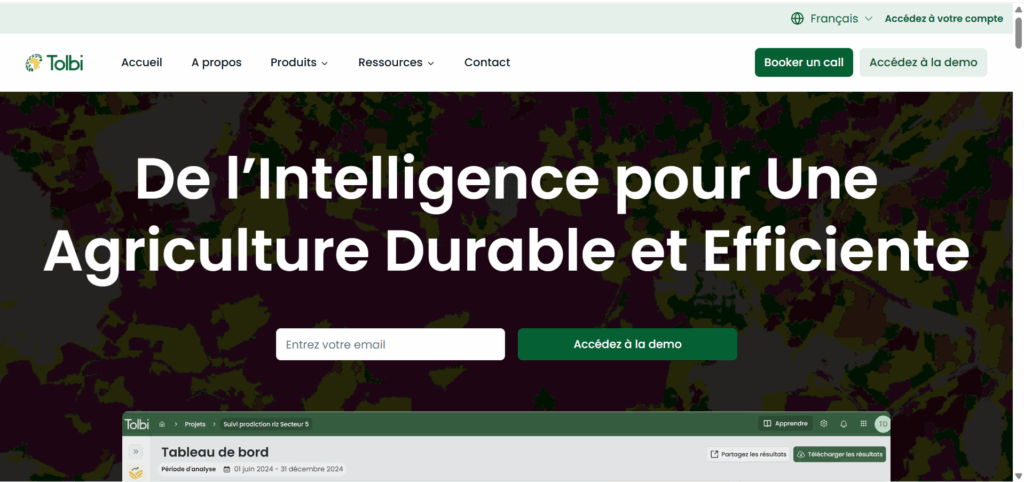
TOLBI is tackling one of West Africa’s most pressing challenges, climate change, by using AI to make agriculture more adaptive, efficient, and sustainable. The Senegal-based startup integrates artificial intelligence with Internet of Things (IoT) sensors to collect and analyse environmental data such as rainfall, soil moisture, and temperature in real time.
Its AI models process this data to provide farmers with precise, localised recommendations on when to plant, irrigate, or fertilise. By predicting drought risks and optimising water use, TOLBI helps farmers reduce losses and maximise yields even under unpredictable weather conditions.
This combination of AI-driven insights and on-the-ground technology enables smallholder farmers to make informed decisions that were once based solely on experience or guesswork. In regions like the Sahel, where climate variability threatens food production, TOLBI’s AI solution provides a lifeline, helping communities protect their livelihoods and secure long-term food security.
8. Botlhale AI (South Africa)
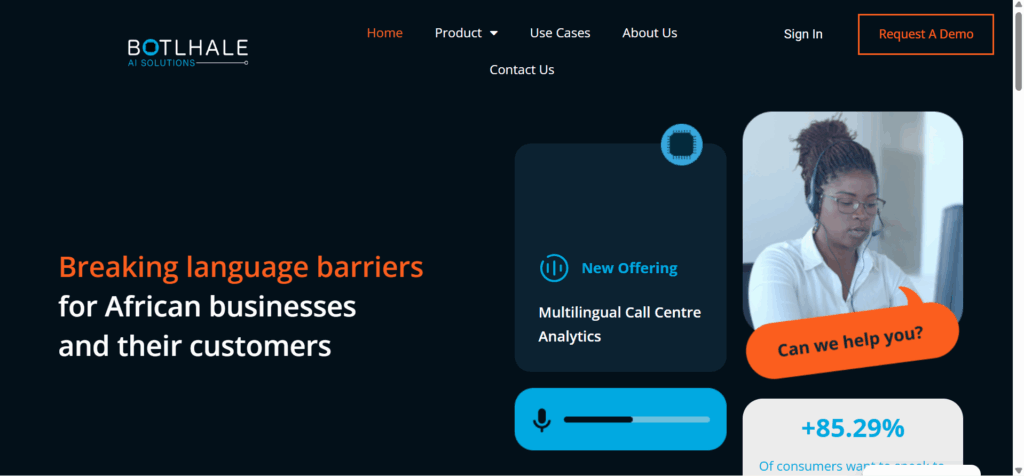
Botlhale AI is addressing one of Africa’s most overlooked challenges, language accessibility in digital services, by using artificial intelligence to build natural language processing (NLP) tools for African languages. The startup’s AI models are trained to understand, process, and generate speech and text in multiple local dialects, enabling seamless communication between businesses and their customers.
Its AI-powered voice assistants and chatbots are used by banks, telecoms, and government agencies to provide services in languages such as isiZulu, Setswana, and Swahili. This not only improves customer experience but also ensures that millions of Africans who prefer local languages can fully participate in the digital economy.
By giving technology the ability to “speak African,” Botlhale AI is solving a real-world problem of exclusion. Its innovations are bridging linguistic gaps, promoting inclusion, and preserving Africa’s cultural diversity while expanding access to vital digital and financial services across the continent.
9. Aerobotics Pty Ltd (South Africa)
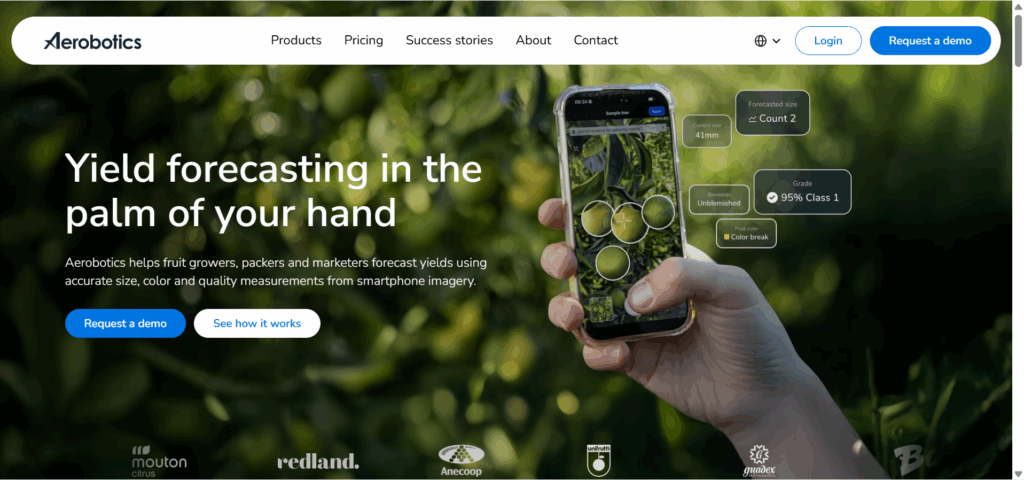
Aerobotics is solving real-world agricultural challenges by combining artificial intelligence, drone technology, and data analytics to help farmers monitor crop health with pinpoint accuracy. Its AI models process high-resolution aerial images captured by drones to identify early signs of crop stress, pest infestations, or nutrient deficiency problems that are often invisible to the human eye until it’s too late.
By detecting issues early, Aerobotics enables farmers to take timely corrective action, reducing crop losses and improving yields. The platform’s AI-driven analytics dashboard provides actionable insights on irrigation, fertiliser application, and resource management, helping farmers optimise inputs and reduce waste.
For a continent where agriculture sustains millions, Aerobotics offers a scalable solution to improve productivity and sustainability. Its use of AI helps farmers make informed, data-backed decisions, turning traditional farming into a high-precision science that boosts food security while conserving valuable resources.
10. Zerone Analytiqs (Ghana)
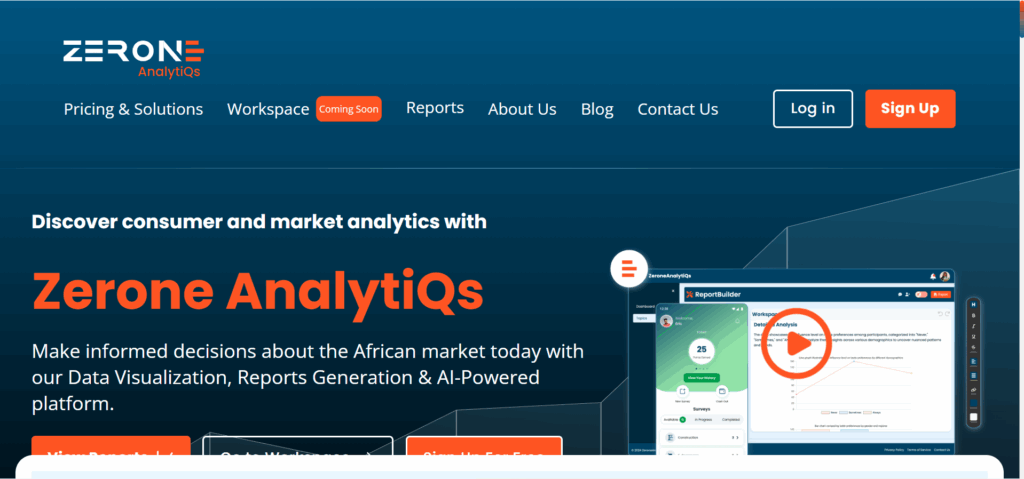
Zerone Analytiqs is solving a critical business challenge across Africa, the lack of accessible data-driven decision-making tools. The Ghanaian startup uses AI and advanced analytics to help companies transform raw data into actionable insights. Its platform leverages machine learning to clean, process, and analyse large datasets, revealing trends, patterns, and performance indicators that guide smarter business strategies.
By automating complex data analysis, Zerone Analytiqs empowers organisations to predict customer behaviour, optimise operations, and identify growth opportunities. Businesses in sectors such as finance, logistics, and healthcare use Zerone’s AI-powered dashboards to monitor performance and make real-time decisions that improve efficiency and profitability.
In a region where data is often underutilised, Zerone Analytiqs is closing the gap between information and impact. Its use of AI is helping African enterprises move from intuition-based management to evidence-based decision-making, strengthening competitiveness and driving sustainable growth.
Africa’s Growing AI Ecosystem
These startups reflect a larger trend sweeping the continent. Africa’s AI ecosystem is expanding rapidly as governments, investors, and innovators recognise the potential of data-driven solutions. Countries such as Nigeria, Kenya, and South Africa are developing AI policies, while hubs in Rwanda, Ghana, and Egypt continue to attract talent and venture capital.
AI in Africa is more than a technology story; it’s an opportunity to close gaps in healthcare, agriculture, and finance, and to build inclusive growth for millions.
See More: Six African Startups Using AI for Customer Support
Get passive updates on African tech & startups
View and choose the stories to interact with on our WhatsApp Channel
Explore
